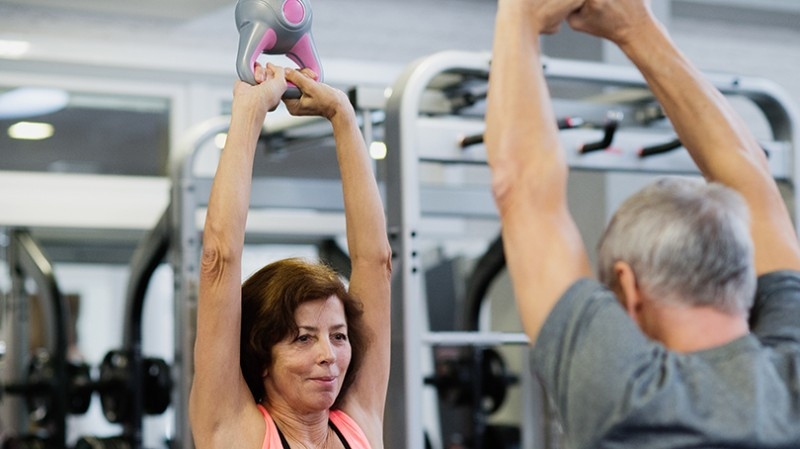September is Healthy Aging Month, and even though the month is drawing to a close, there's never a bad time to be thinking about healthy aging and what you're going to do about it in the coming years. That's regardless how old you are right now. They say it's never too late to start a new hobby or learn a new skill; flip that philosophy, and you can say it's never too early in life to be thinking about and preparing for your future health, especially once the gray hairs start popping up.
Big Numbers on the Horizon
Thanks to factors such as a cleaner atmosphere, improved medical care, and an increased awareness of proper exercise and nutrition, the life expectancy of Americans has increased significantly in recent decades. While the current U.S. life expectancy is around 80 years, living into our 80s and 90s has become a more realistic proposition, per webmd.com. Consider these facts: between 2000 and 2015, the number of centenarians living in America increased from 50,000 to about 72,000, an increase of 44 percent; second, projections have it that half the children born in the U.S. in 2000 or later could live to be 103. Beyond those glowing numbers, though, is the harsh reality that in order to make it to 80 or 90 or 100, you are well advised to develop good health habits now, knowing that your body will continue to face new challenges as you get older. Scientists have postulated that a person's genetics can be the key determinant regarding not only your projected longevity but what health-related obstacles, and when, you can expect to encounter along the way. But there's more to this than genetics – you have the power to make a (healthy) difference. So, what can you do now – hopefully – to start tacking on years to your life expectancy? Start with a consultation with your personal physician to collaborate on mapping out a plan that, per mayoclinic.org, should start with a diet that includes a variety of nutritious foods – while practicing portion control, and make physical activity a regular part of your daily routine. At the same time, beware anything gimmicky that promises you a fountain of youth or any other surefire way to shave years off your life. Stick to the safe and sound basics, and be diligent and consistent about it.10 Tips for Healthy Aging
Here are 10 things to consider incorporating into your lifestyle (if you are already doing some or even all of them, keep up the good work) if you are serious (but relaxed; stay chill) about extending your life as well as your quality of life. Along the way, though, don't be shocked if you see changes in yourself in such areas such as muscle mass, sex drive, vision, and cardiovascular health, per Mayo Clinic. With dedication to a healthy regimen, you can help your body ward off or at least alleviate these inevitable downturns and have a more enjoyable, longer, and healthier golden years:- Get adequate amounts of calcium and vitamin D from your diet. This is to promote your bone, joint health, and muscle health, per Mayo Clinic. Use supplements as necessary. Check with the Institute of Medicine for recommended daily intake.
- Eat healthy. Your diet should include ample servings of fiber, which can be found in fruits, vegetables, and whole grains. Avoid foods high in fat, and skimp on dairy products and sweets.
- Go to the toilet regularly – both for urination and bowel movements. Don't hold it in. Along those lines, take measures to avoid constipation – consuming high-fiber foods will help in that regard. Big picture: take care of your bladder and urinary tract health.
- Stay physically active and mentally active – both will help you in maintaining, or at least slowing loss of, cognitive function for the long haul. Exercise needs little explanation, except aim for at least two hours a week of cardio such as walking, biking, and swimming. Mentally stimulating activities, such as puzzles, can help. Heck, try learning how to play a musical instrument.
- Watch your numbers. Focus on blood sugar, blood pressure, cholesterol, and weight. Get with your physician to develop a plan, as necessary, to get or keep your numbers in a healthy range. Nutritional supplements can be a big help in all areas.
- Care for your teeth. Brush them at least twice a day and floss them daily. Regular dental checkups are a must, too – figure on every six months.
- Take up dancing. Tap dancing and even ballet might be a bit much for most elders to handle, but, certainly, ballroom dancing is do-able. The social aspect is also important to your health via peace of mind and human interaction. Another great option, per activebeat.com, is line dancing, maybe even some boot-scootin'.
- Get a pet. A dog can make a great companion and tap into your parental instincts without the pressure of child-rearing, and those twice-daily walks with the dog are great exercise. WonderLabs also carries a variety of pet health and nutrition products.
- Quit smoking. If you don't smoke, stay a nonsmoker. This is a no-brainer.
- Get plenty of sleep, every night. Afternoon naps are good, too, as long as they don't interfere with a good night's sleep. Seven-eight hours of sleep a night are a good standard.

